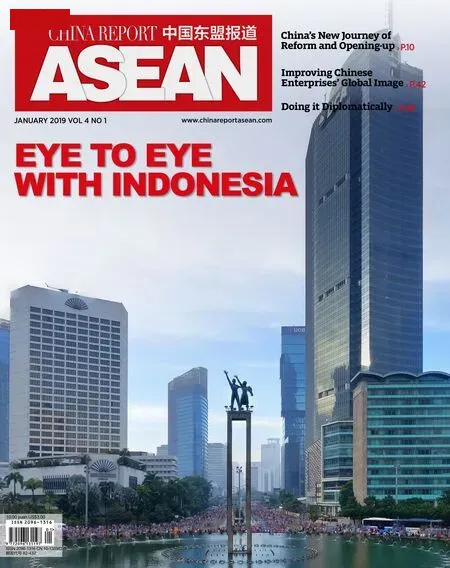FLYING HIGH THROUGH TURBULENCE:ASEAN ECONOMIC OUTLOOK 2O19
By Wang Qin
ASEAN economies enjoyed stable growth in 2018, with most maintaining moderate growth.With increasing economic power and rising international status, the region was one of the most dynamic corners of the global economy last year. In recent years, ASEAN economies have achieved tangible progress in accelerating industrial restructuring,improving the business environment and enhancing international competitiveness. Forecasts for 2019 expect ASEAN member states to sustain moderate growth, but uncertainties that could disturb the region’s economic growth will increase.
Readjustment of Economic Strategies
Against the backdrop of a global economic slowdown in the last few years, the growth rate of ASEAN economies eased, but the regional economy remained resilient and maintained a moderate rate of growth. In 2017, the development of world economy accelerated on the whole, and ASEAN countries’economic growth also improved.
Riding the wave of Industry 4.0, governments of ASEAN member states have successively readjusted their economic strategies to upgrade industrial structure and optimally address opportunities and challenges introduced by the new round of industrial revolution.
In 2016, Singapore launched a S$4.5 billion (US$3.29 billion) “Industry Transformation Programme” to help 23 sectors in manufacturing and services improve capabilities, investment skills, innovation and internationalization. Specific areas in manufacturing include energy engineering, precision engineering,marine engineering and aviation.
The same year, the Thai government announced the “Thailand 4.0” strategy, which highlights 10 major industries as new engines of future economic development, namely next-generation automotive, smart electronics, luxury and wellness tourism, agriculture and biotechnology, food for the future, robotics, aviation and logistics, biofuel and biochemicals, the digital economy and medical services. At the same time, the Eastern Economic Corridor (EEC) was listed as a strategic project.
In April 2018, Indonesian President Joko Widodo announced a roadmap called “Making Indonesia 4.0.” Five focus industries, namely electronics,automotive, food and beverage, textile and apparel and petrochemicals, have been selected as key drivers for manufacturing. Development of digital infrastructure in these sectors will the strengthened.
Two months later, the government of Vietnam approved a plan to develop sustainable smart cities between 2018 and 2025 as part of a vision for 2030 and an effort to boost development in the era of Industry 4.0.
Governments of ASEAN countries have attached great importance to the improvement of business environments in recent years. To promote trade liberalization and facilitation, investment in infrastructure has increased and numerous policies have been implemented such as expanding areas for foreign investment, relaxing restrictions on foreign businesses, lowering costs of logistics and improving the efficiency of public services.
Among them, Indonesia and Vietnam have made the most notable improvements. From September 2015 to August 2017, the Indonesian government launched a total of 16 economic policy packages aimed at tackling an array of problems in trade, logistics,land acquisition, public services and administration.The government of Vietnam established a national one-stop service mechanism to improve efficiency through streamlining approval and customs clearance procedures. The country has also participated in the ASEAN Single Window, a regional initiative with the objective of expediting cargo clearance by enabling electronic exchange of trade-related documents such as Certificate of Origin Customs and Customs Declaration Documents among ASEAN member states.
Increasing Uncertainty
ASEAN has become an important growth pole for both the regional and global economy. With the third largest population in the world following only China and India, the bloc is now the world’s sixth largest economy after the United States, China, Japan, Germany and the United Kingdom and the world’s fourth largest importer and exporter after the United States, China and Germany. The region is also a major destination for foreign direct investment. With Cambodia identified as a middle-income country in 2016, so far four ASEAN member states (Cambodia, Laos, Myanmar and Vietnam) are no longer low-income countries and have reached middle-income levels.


After a 10-year recovery from the global financial crisis,the world economy has recently been showing a trend of general growth. The economies of developed countries will continue to recover while the growth of emerging economies will accelerate. However, the road to recovery remains bumpy due to an unstable foundation. The United States has accelerated adjustment of monetary policy and implementation of its tax reform plan. The faster-than-expected rate hike of the Federal Reserve will lead to the tightening of global financial conditions, and China-U.S. trade friction will drag the world economy at large. As a result, emerging markets will endure pressure from both trade and financial sectors. At the same time,potential geopolitical risk will also increase uncertainties of world economic recovery.
In the context of the ongoing global economic restructuring, most ASEAN member states will sustain a moderate rate of growth in 2019, but uncertainties influencing the region’s economic growth will increase. The reorganization of global value chains and the regional production network will create both opportunities and challenges. Trade disputes between major economies will have an impact on the regional and global business environment, and the tightening of global financial conditions will aggravate fluctuations in financial markets of ASEAN countries.Meanwhile, the regional economic integration of ASEAN still faces several challenges such as expanding the free flow of production factors in the region and narrowing the development gap.
Furthermore, since Indonesia and Thailand will hold general elections in 2019, changes in the political scene will also be a key factor for the prospects of economic development in the region.About the author Professor Wang Qin is director of the Center for Southeast Asian Studies at Xiamen University.

